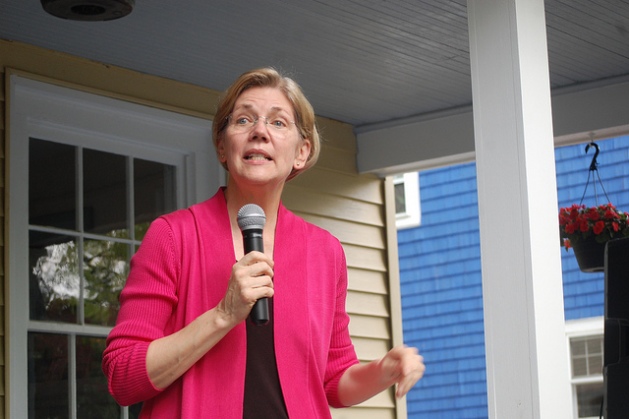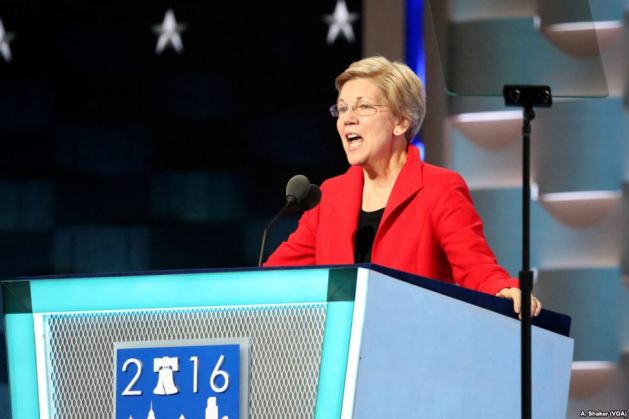
Bernie Sanders campaigning in Phoenix. Photo (cc) 2015 by Gage Skidmore.
Previously published at WGBHNews.org.
Bernie Sanders is an unlikely savior of journalism.
The iconoclastic senator has long had a prickly relationship with the press in his home state. According to Paul Heintz, a staff writer with the alt-weekly Seven Days, Sanders hasn’t granted a full-fledged interview in more than four years to the paper, which touts itself as the state’s largest. And Seven Days is not alone. “I would say that it’s highly unusual for an elected official in Vermont to not regularly speak to Vermont reporters,” Heintz said. “I think it’s problematic.”
Then, last month, Sanders claimed without evidence that The Washington Post covered him critically because of his attacks on Amazon, whose founder and chief executive, Jeff Bezos, also owns the Post. “The remark sounded an awful lot like the kind of criticism leveled by someone else,” said NPR’s Domenico Montanaro. That someone else: President Trump.
But apparently you don’t have to love the media to appreciate its vital role in a democracy. Because last week Sanders, an independent socialist who is once again seeking the Democratic presidential nomination, outlined a solid media-reform proposal in an essay for the Columbia Journalism Review.
“Real journalism requires significant resources,” he wrote. “One reason we do not have enough real journalism in America right now is because many outlets are being gutted by the same forces of greed that are pillaging our economy.”
Sanders devoted much of his piece to rehashing the financial crisis that has brought news organizations to their knees, especially at the local level. But he also offered some specific ideas that fall into three categories:
• Opposing media mergers such as the proposed combination of the GateHouse Media and Gannett newspaper chains as well as the CBS-Viacom deal. Media companies would be required to detail how many journalism jobs would be lost in such mergers. Employees would have an opportunity to buy their media companies. Unions would be strengthened. And ownership caps would be re-imposed on broadcast outlets for the first time since 1996 in the hopes of restoring localism and diversity.
• Swinging the antitrust club at Google and Facebook, which, as Sanders observed, now vacuum up some 60 percent of all digital advertising revenues. It’s not clear how any actions Sanders might take against the two internet giants would benefit journalism. He doesn’t help his cause by citing a flawed study claiming that, in 2018, “Google made $4.7 billion off reporting that Google did not pay for.” (Well, no, not really.) But there’s little question that both companies have benefited from free content provided by newspapers and other media outlets. At the very least, Sanders seems likely to support a temporary antitrust exemption that would allow the news business to negotiate some sort of revenue-sharing deal.
• Taxing targeted advertising — that is, ads served up based on the data that has been collected about you — and using it to fund “nonprofit civic-minded media.” This is an idea that has been promoted by the media-reform organization Free Press “to support local-news startups, sustain investigative projects, seed civic-engagement initiatives, and lift up diverse voices that have long been excluded from traditional media coverage.” Government funding of journalism is bound to be controversial, even though it already takes place to a limited degree with public radio and television. But there are ways to insulate such funding from political interference — though skepticism is certainly warranted.
Sanders’ proposal drew instant mockery from the libertarian-conservative end of the political spectrum, with Jack Shafer of Politico writing that it “folds on itself and collapses.” Jeff Jacoby of The Boston Globe added: “When you’re Bernie Sanders and your only tool is socialism, every problem looks like a capitalist to be bashed.”
But parts of Sanders’ plan are likely to resonate with the public — especially his targeting of Google and Facebook, which are increasingly unpopular for violating our privacy and harming democracy. Indeed, Sanders’ rival Elizabeth Warren beat Sanders to the punch by many months in proposing to break up Google, Facebook and Amazon.
One way that corporate media owners succeed in defending their turf is by controlling the terms of the debate. Thus you will hear that Sanders proposes to impose new regulations on an industry that, for the sake of the First Amendment, ought to be as unregulated as possible. But as the media scholar Robert McChesney has observed, the alternatives are not regulation or deregulation; rather, they come down to what kind of regulation we want — in the public interest, or in the corporate interest?
This is especially true in the case of broadcast media, which must be regulated because there are only a limited number of frequencies available. Sanders, to his credit, is not proposing the return of anti-free-speech policies such as the Fairness Doctrine and equal-time provisions. Rather, he seeks to ensure diversity of ownership while letting the content take care of itself.
Sanders may not like journalists very much, but he understands the importance of journalism. Far from being radical, his plan pulls together some strands that have been around for quite a while. Teddy Roosevelt would praise his stance against mergers and in favor of taking some sort of action against the monopolistic practices of Facebook and Google.
Whether Sanders becomes our next president or not, his proposals amount to a serious attempt to wrestle with the forces that have harmed journalism and have concentrated media power in the hands of a few. Voters and his fellow candidates should take notice.



